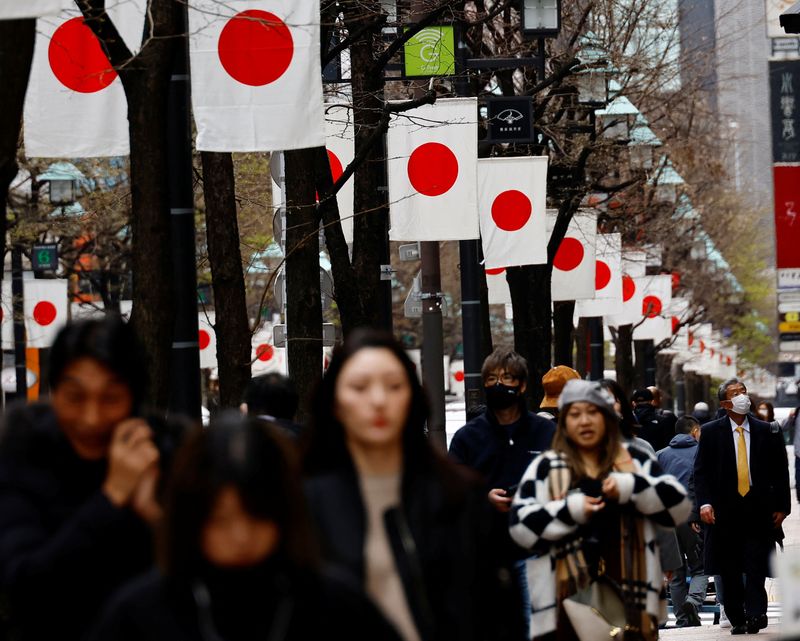By Leika Kihara
TOKYO (Reuters) -The Bank of Japan (BOJ) ended eight years of negative interest rates and other remnants of its unorthodox policy on Tuesday, making a historic shift away from its focus on reflating growth with decades of massive monetary stimulus.
While the move was Japan's first interest rate hike in 17 years, it still keeps rates stuck around zero as a fragile economic recovery forces the central bank to go slow on further rises in borrowing costs, analysts say.
The shift makes Japan the last central bank to exit negative rates, and ends an era in which policymakers around the world sought to prop up growth through cheap money and unconventional monetary tools.
"We reverted to a normal monetary policy targeting short-term interest rates, as with other central banks," BOJ Governor Kazuo Ueda said at a press conference after the decision.
"If trend inflation heightens a bit more, that may lead to an increase in short-term rates," Ueda said, without elaborating on the likely pace and timing of further rate hikes.
In a widely expected decision, the BOJ ditched a policy put in place since 2016 by former Governor Haruhiko Kuroda that applied a 0.1% charge on some excess reserves financial institutions parked with the central bank.
The BOJ set the overnight call rate as its new policy rate and decided to guide it in a range of 0-0.1% partly by paying 0.1% interest to deposits at the central bank.
"The BOJ today took its first, tentative step towards policy normalisation," said Frederic Neumann, chief Asia economist at HSBC (LON:HSBA) in Hong Kong.
"The elimination of negative interest rates in particular signals the BOJ's confidence that Japan has emerged from the grip of deflation."
The central bank also abandoned yield curve control (YCC), a policy in place since 2016 that capped long-term interest rates around zero, and discontinued purchases of risky assets.
But the BOJ said it will keep buying "broadly the same amount" of government bonds as before and ramp up purchases in case yields rise rapidly, underscoring its focus on preventing any damaging spike in borrowing costs.
In a sign future rate hikes will be moderate, the BOJ also said it expects "accommodative financial conditions to be maintained for the time being."
Japanese shares rose after the decision. The yen fell below 150 per dollar, as investors took the BOJ's dovish guidance as a sign the interest rate differential between Japan and the United States likely will not narrow much.
'A NORMAL COUNTRY'
With inflation exceeding the BOJ's 2% target for well over a year, many market players had projected an end to negative interest rates either in March or April.
Expectations for a shift this week heightened significantly after unions' annual wage talks with major firms delivered the biggest pay hikes in 33 years.
The end of the Kuroda era stimulus now swings the focus for markets, analysts and the wider public to when the BOJ will raise rates further.
Already on Tuesday, commercial banks flagged plans to raise some of their deposit rates for the first time since 2007. Nomura and BNP Paribas (EPA:BNPP) both expect the BOJ to hike rates again before the end of the year.
"Essentially we're a normal country," said Bart Wakabayashi, State Street (NYSE:STT) Tokyo Branch Manager.
"How does this impact households locally and their spending power? I think that's going to be the next big discussion and with an eye to that I don't think the BOJ can do anything beyond what they've announced."
Under Kuroda, the BOJ deployed a huge asset-buying programme in 2013, originally aimed at firing up inflation to a 2% target within roughly two years.
The central bank introduced negative rates and YCC in 2016 as tepid inflation forced it to tweak its stimulus programme to a more sustainable one.
As the yen's sharp falls pushed up the cost of imports and heightened public criticism over the demerits of Japan's ultra-low interest rates, however, the BOJ last year tweaked YCC to relax its grip on long-term rates.
There are still risks. A spike in bond yields would boost the cost of funding Japan's huge public debt which, at twice the size of its economy, is the largest among advanced economies.
An end to cheap funds could also jolt global financial markets as Japanese investors, who amassed overseas investments in search of yields, shift money back to their home country.
Even as it rolled back stimulus, the BOJ downgraded its assessment on the economy and warned of consumption weakness.
Ueda said inflation expectations have yet to be anchored at 2%, which means the BOJ can raise rates at a slower pace than other central banks did in recent years.
"If our price forecast clearly overshoots or, even if our median forecast is unchanged, we see a clear increase in upside risk to the price outlook, that will lead to a policy change," Ueda said on the likely threshold for further rate increases.
